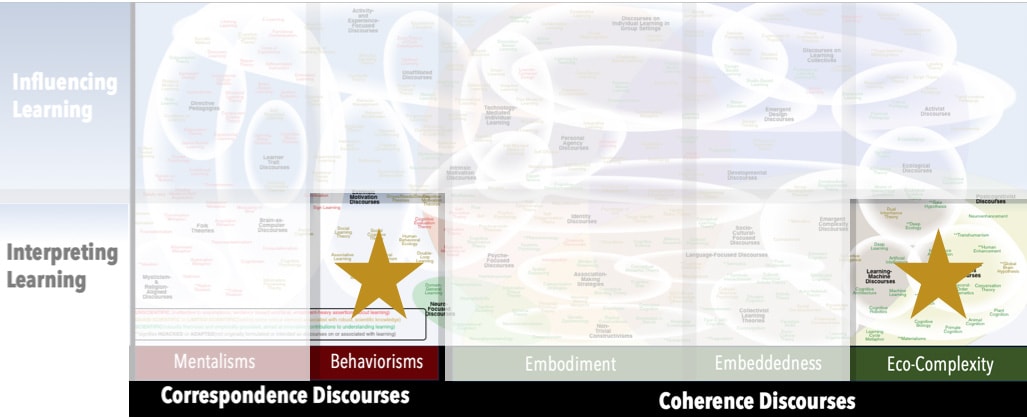AKA
Human Evolutionary Ecology
Focus
Optimization of behaviors in a cultural ecologyPrincipal Metaphors
- Knowledge is … scope of possible behaviors
- Knowing is … optimized behavior
- Learner is … an individual situated in a cultural context
- Learning is … adaptive changes in behavior
- Teaching is … N/A
Originated
1990sSynopsis
Included among Behaviorisms, Human Behavioral Ecology combines the notion of optimization with evolutionary theory to make sense of behavioral diversity within social, cultural, and intercultural contexts. (Most Behaviorisms look principally to external reward structures to explain diverse behaviors.) Focusing on core principles from evolutionary theory, Human Behavioral Ecology focuses on variation and selection, aiming to explain the flexibility in human behaviors (variation) in terms of adaptations that optimize fitness to a cultural ecology (selection).Commentary
With its focus on behaviors, Human Behavioral Ecology is subject to the same critiques as most Behaviorisms. Further, by prominently invoking “optimization,” Human Behavioral Ecology seems to have embraced one of the major fallacies associated with Darwinian evolution – namely, that the notion of “survival of the fittest.” Darwin’s theory, and Universal Darwinism, is oriented by the principle of “survival of the fit” – that is, the criterion for survival is not optimality, but adequacy/sufficiency/being-good-enough. The phrase “survival of the fittest” was coined by Herbert Spencer, and it served as the foundation of hi famously discredited “Social Darwinism.”Authors and/or Prominent Influences
Eric Alden SmithStatus as a Theory of Learning
Human Behavioral Ecology is a theory of learning.Status as a Theory of Teaching
Human Behavioral Ecology is not a theory of teaching.Status as a Scientific Theory
Oddly, proponents of Human Behavioral Ecology do not seem to have made the connection between “systemic learning” and “systemic evolution” (see Universal Darwinism), but that lapse could be attributable to the blindered focus on individual behaviors. As well, because of the theory’s reliance on the discredited notion of “optimization,” which is inconsistent with most interpretations and applications of evolutionary theory, it cannot be considered scientific. (Notably, some authors opt for “high fitness” rather than “optimization.” Although more palatable, the shift does not solve the problem.)Map Location

Please cite this article as:
Davis, B., & Francis, K. (2020). “Human Behavioral Ecology” in Discourses on Learning in Education. https://learningdiscourses.com.
⇦ Back to Map
⇦ Back to List
